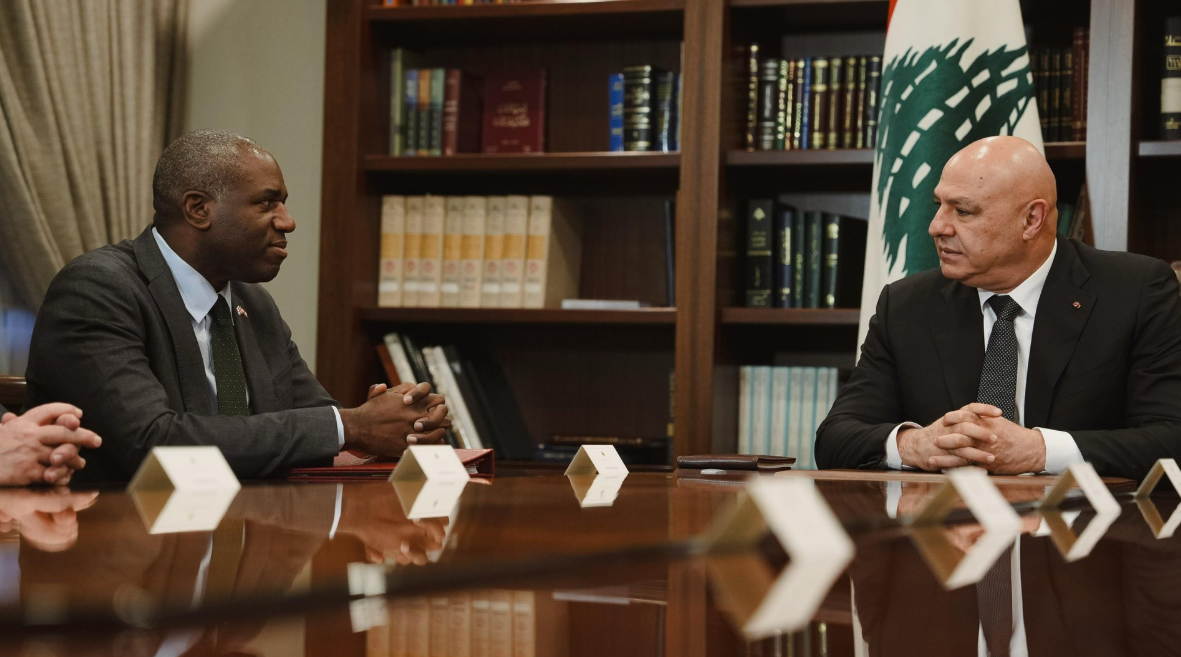UK Foreign Secretary David Lammy visits Lebanon and Syria to reaffirm UK support for regional peace, security, and reform. Meeting with Lebanese and Syrian leadership, the UK calls for ceasefire enforcement, reforms, and stronger bilateral relations.
UK Reaffirms Strong Support for Lebanon’s Stability and Prosperity Amid Regional Tensions
In a significant move amid rising tensions in the Middle East, UK Foreign Secretary David Lammy visited Lebanon on Friday, July 4, 2025, as part of his wider regional diplomatic mission. The visit underlines Britain’s ongoing commitment to Lebanon’s security, stability, and long-term prosperity during a critical period for the region.
During his official trip, the Foreign Secretary held a high-level meeting with Lebanese President General Joseph Aoun at the Presidential Palace. Discussions focused on the latest developments in Lebanon and the broader region, with both leaders emphasizing the deep-rooted UK-Lebanon bilateral relations and the urgent need for peace.
David Lammy emphasized the critical importance of implementing the ceasefire agreement in full, specifically highlighting the need for the withdrawal of Israeli forces and the full deployment of the Lebanese Armed Forces (LAF) in Southern Lebanon. He expressed confidence that these steps were essential for achieving a lasting peace and stability in Lebanon and the region.
The Foreign Secretary also applauded the long-standing and resilient partnership between the UK and Lebanon, especially the robust cooperation with the Lebanese Armed Forces. Since 2009, the UK has invested more than £115 million to strengthen the LAF through infrastructure development, supply of vehicles, and capacity-building via training and equipment support. Furthermore, since 2013, the UK has supported the creation and expansion of the Land Border Regiments (LBRs) along the Lebanon-Syria border, bolstering the country’s border security and sovereignty.
Lammy reiterated the UK’s strong support for the United Nations Interim Force in Lebanon (UNIFIL) and its vital role in maintaining peace and stability in the southern region under UN Security Council Resolution 1701. He underscored the urgency for Lebanon to implement critical economic reforms, especially those necessary to secure an agreement with the International Monetary Fund (IMF), which would open the doors for economic revival and foreign investment.
The British Ambassador to Lebanon, Hamish Cowell, echoed these sentiments and welcomed the Foreign Secretary’s timely visit, particularly against the backdrop of rising regional tensions. He called for continued efforts to ensure a lasting ceasefire and emphasized that the Lebanese Army must be the sole legitimate defender of Lebanon. Cowell also reinforced the importance of implementing UNSCR 1701, which he described as a cornerstone for Lebanon’s and the region’s future security.
He further stated that Lebanon’s recovery depends on immediate and essential reforms, including justice and transparency, which are prerequisites to rebuilding trust and unlocking international financial aid.
The Foreign Secretary’s trip also included a historic visit to Syria — the first by a UK Minister in 14 years — signaling a renewed chapter in UK-Syria relations. In Syria, David Lammy met with President Al-Sharaa and Foreign Minister Al-Shaibani. During the talks, he emphasized the importance of an inclusive and representative political transition in Syria and expressed the UK’s continued support for the Syrian people in their pursuit of peace, stability, and recovery.
This regional tour by the UK Foreign Secretary marks a decisive effort by Britain to play a constructive role in supporting peace, security, and economic progress in one of the world’s most volatile regions. The UK has reaffirmed its status as a steadfast partner to both Lebanon and Syria, supporting not only military cooperation but also institutional and political reform for a more stable and prosperous future.
Disclaimer:
This article is based on official statements and diplomatic developments as of July 4, 2025. Information provided reflects the views and positions of UK government representatives and may be subject to change with evolving geopolitical circumstances.

